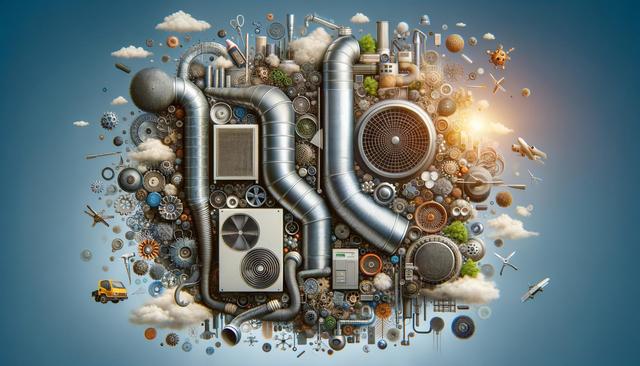Understanding the Importance of HVAC Duct Cleaning
Homeowners often overlook the significance of maintaining clean HVAC ducts, but understanding its importance can remarkably enhance the living environment. Clean ducts are essential for ensuring optimal air quality within the home, as they transport the air that circulates throughout your living spaces. When ducts are clogged with dust, debris, or mold, the air quality suffers, potentially leading to health issues such as allergies and respiratory problems. Moreover, clogged ducts can increase energy costs because the HVAC system has to work harder to circulate air, which can also lead to premature wear and tear on the system components. By investing time in regular duct cleaning, homeowners can enjoy healthier air, reduced energy bills, and prolonged lifespan of their HVAC systems.
Signs of Blocked Ducts and Early Detection
Identifying early signs of blocked ducts is crucial in preventing more serious issues. Homeowners should be on the lookout for symptoms such as increased dust levels in the home, inconsistent room temperatures, and unusual noises coming from the HVAC system. Another indicator of blockages is a noticeable increase in energy bills without a change in usage patterns. Regular inspection is recommended, especially during seasonal transitions when HVAC usage may vary. Homeowners can check for blockages by visually inspecting registers and vents, using a flashlight to look for debris buildup. Early detection allows for timely intervention, reducing the potential for larger, more costly repairs or replacements.
DIY Duct Cleaning Tips for Homeowners
While professional cleaning services are available, homeowners can take some steps to clean their ducts themselves. Here are a few simple tips to keep your ducts in top shape:
- Turn off the HVAC system before starting the cleaning process.
- Remove vent covers and use a vacuum with a long hose attachment to reach into the ducts and remove debris.
- Use a brush to scrub away stuck-on dirt or mold from the duct walls.
- Regularly replace HVAC filters to prevent dust and debris from entering the system.
By following these steps, homeowners can maintain cleaner ducts between professional services, ensuring continuous airflow and efficiency.
Preventive Strategies to Enhance Ventilation
Implementing preventive strategies is essential for maintaining an efficient ventilation system. One effective strategy is to schedule regular professional inspections and cleanings every 3 to 5 years, depending on the home’s location and usage. Additionally, using high-quality air filters can significantly reduce the amount of dust and debris that enters the ductwork. Homeowners should also consider installing air purifiers to trap airborne particles before they circulate through the HVAC system. Finally, sealing any leaks in the ductwork can prevent the loss of conditioned air, ensuring that your system operates efficiently and effectively.
Benefits of Regular Maintenance
Regular maintenance of the HVAC duct and ventilation system provides numerous benefits. First and foremost, it improves indoor air quality, which is essential for the health and comfort of all household members. Clean ducts ensure that the air circulating throughout the home is free from pollutants and allergens. Additionally, proper maintenance reduces the workload on the HVAC system, thereby extending its lifespan and reducing the likelihood of costly repairs. Energy efficiency is another benefit, as a well-maintained system can significantly lower energy bills by ensuring that the system does not have to work overtime to maintain desired temperatures.
Conclusion
For homeowners, investing in HVAC duct cleaning and ventilation system maintenance is a vital step towards ensuring a healthier home environment. By understanding the importance of clean ducts, recognizing early signs of blockages, and following preventive strategies, homeowners can optimize their system’s performance. Regular maintenance not only enhances air quality but also contributes to energy savings and a longer lifespan for the HVAC system, making it a wise investment in your home’s future.
